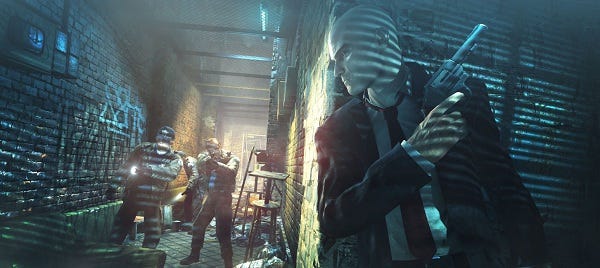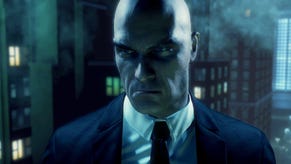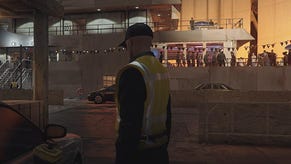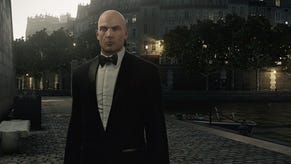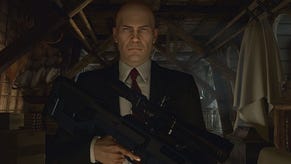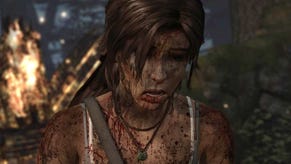Hands-On: Hitman - Absolution
Designated hitter
So many bodies stuffed into closets, so many innocents caught in the crossfire, so much blood on my hands. Out, out damn spot. Oh no, wait I was wearing gloves the whole time. Everything's fine. Hitman: Absolution is best played without a conscience for its pleasures are of flesh punctured and perforated. I’ve killed in many ways as I played through the game’s opening missions and after the early elation of having the piano wire back in my hands, I've had a long think about the best and the worst of the experience.
Slitting, stabbing, shooting, shoving, sniping, silently strangling, softly sneaking, surreptitiously striking skulls – Hitman: Alliteration does all of those things well. It’s hard to express how pleased I was, without sounding like a maniac, when I pushed a man into a steam vent; an assassination about as aggressive as a Worms' ‘prod’.
Walking away from a dead target, merging with a crowd as panicked voices begin to rise, is one of gaming’s great joys, combining the satisfaction of a puzzle complete, architecture understood and intelligence overcome. I don’t even think the kill is a necessary part of the process, picking a pocket or stealing a painting would involve the preceding steps, but that said, Absolution goes to great lengths to show the beauty of an ugly death, partly by showing just how ugly the lives of these men are, and partly by being an astonishingly attractive game.
My jaw doesn’t actually drop, it’s just not a thing that happens to me, but if I were a little slack in the mandible department I’d have been wide-mouthed for much of the game’s opening. The detail in the characters, textures and locations is intricate. Agent 47 has, I think it’s safe to say, the most detailed cranium in the history of interactive entertainment. When he’s hiding in a dumpster or a wardrobe and the camera pulls in close, right next to the gleaming dome, it’s like seeing the surface of some strange planet. There’s geography there, in the scars, sweat and blemishes. I think I saw rudimentary lifeforms.
It’s an extraordinarily beautiful game and it can, if you so desire, use everything your PC has to offer to make itself more beautiful. Turn everything up to its highest level and it’ll probably start chopping up any inessential components and chucking them in a furnace to burn. More power, Hitman: Alliteration shrieks, feed me more and my city streets shall sing a symphony of simulated splendour. Some of that power is used to make 47’s head into a bloom magnet, reflecting every light back at itself and becoming a sort of disco ball. You can turn that off if you want. Most of what Hitman does with its six billion graphics is admirable. They add detail rather than gloss, help to build a sense of place, and build crowd scenes that are wonderful to behold.
Those crowds, packing more entities onto the screen than an over-exuberant sardine cannery worker, best demonstrate the game’s technical muscle. Entering Chinatown for the first time, pushing through the masses gathered around street food stalls, I thought Hitman might ruin cities in other games. The towns and villages of a Skyrim, with their few houses and fewer people, seem more abstract than ever in comparison. And the crowds here have a purpose, reminding of the great promise that Assassin’s Creed’s early trailer displayed so long ago; they are places in which to hide, from which to strike, and when the shooting starts, they are great rushing, screaming shields of flesh.
Once in the thick of the crowd, realising the number of options for this, the first proper kill, is a wonderful feeling. I slit his throat in an alley, I sniped him through the bustle from a window, disguised as a cop. I dealt him contaminated drugs. There’s so much more I could have done. At that point, I was a happy hitman, my glee accentuated by the difficulty options, which allow all assists, checkpoints, clues and so forth to be switched off. There are five levels, the highest being purist, which leaves you with nothing but your own eyes and wits, and one bar of instinct, the x-ray enemy marker and slowdown trigger that’s far less intrusive than I feared.
But the action - outbreaks of violence that turn the game from stealth puzzle to cover-based shooter – is intrusive and occurs far more frequently than I’d like. If shootouts are the result of a botched infiltration, a disguise blown or a body discovered, I enjoy their drama and occasional elegance a great deal, but too often they seem the only option, or at the very least, the favourable option. My preferred levels in any Hitman games have always been the ones where a target is unaware of the immediacy of danger, even if well guarded, and goes about a routine. 47 begins at point A and must identify the various routes to a moving target, learning where that target is vulnerable and in what manner he may best be killed.
In what I’ve played of Absolution there are only three areas that do this well. The opening mission, a tutorial that manages to offer options and macabre delights, is a pleasure to play. Infiltrating a mansion, the player is introduced to disguises, shown that any NPC with the same costume will eventually see through a disguise, at first concerned that he doesn’t know this particular pastry chef, then questioning him, and eventually, if nothing is done to dissuade him, alerting the men with guns.
Dissuasion can be in the form of murder, incapacitation, removing oneself from the scene, or hiding your face. This last can be done either by activating ‘instinct’, which drains during the process, or by finding a spot to hide in plain sight. These are places where a telephone directory can be browsed, for instance. 47 leafing through it, not a threat, just one of the guys. Choose to leave the scene and the suspicious NPC may follow, in which case it’s sometimes best to sprint once out of sight, or slip into a closet and wait until the pursuer gives up the search and goes back to his routine.
All of this can be hugely entertaining. Intentionally luring a guard into a toilet and knocking him out in order to steal his uniform, I was caught by a man in a shirt and tie. He just wanted to empty his bladder and instead he found a man dragging another man, semi-naked, across the tiles, preparing to dump him in a cubicle. I panicked, shot the newcomer with a silenced pistol and prepared to pile them both in the cubicle. The door opened again.
I ended up with five bodies, in a pile. It was this scene.
Emergent comedy is one of the series’ strongest cards and Absolution occasionally offers all the staging, props and actors for farce of the highest order. But it also has large, impressive, awkward, linear setpieces, and those are not a highpoint of the series, and certainly not of this entry.
The hotel mission is a classic slice of man hitting man. A bad bastard is holed up on the eighth floor and his personal bodyguards have taken over the rest of the hotel, blocking other guests from going upstairs and disabling all the lifts. Even that setup blemishes the occasion a little, with the lockdown making the hotel more like a military complex with hotel wallpaper. From ‘get to the eighth floor’, the mission becomes segmented. Complete the ground floor and then you’re on the seventh. So the hotel might as well be three stories high but they are good stories with multiple routes, non-violent possibilities and all sorts of objects to manipulate and environments to navigate.
That’s the game at its best but it’s followed by one of the weaker portions. Once the target is reached, 47 is on the run, the hotel burning, the police surrounding it. From stealth-puzzler to running and gunning. It’s probably still possible to stealth through those sections of the game but it feels counter-intuitive. Everybody is already trying to kill 47, with maximum force (including a helicopter with machinegun), it seems daft to stick to the shadows. The urgency of being in an exploding hotel also tends to emphasise action over caution.
From that point, 47 is a wanted man so no more does he have the luxury of arriving at a scene, scoping it out and wandering among the people. If he steps out of cover he’s likely to be shot. The library level, which has been shown extensively in videos, is part of this sequence and it’s enjoyable enough, but at those points Absolution has become ‘get from point A to point B by stealth or by shooting’, with no target other than an exit.
The plot perhaps carries some of the blame. I always preferred Hitman when he was kind of anonymous and I have no investment in the supporting cast or sci-fi silliness, but there’s a lot of story here, told in dialogue, and cutscenes whose actors feast on the scenery as if it were a chewtoy. The badguys are really bad, the good guys aren’t much better and the women are in showers or in blouses that only seem to have buttons up to the middle of their chest. There haven’t been any nuns yet but female characters are variously strippers, a sultry secretary henchwoman and victims of brutish men. Chicago does not appear to have female police officers.
Playing through this opening portion of the campaign was like the inverse of experiencing the marketing campaign for the game. Instead of doubt transforming into excitement, the thrill of the excellent early hit parade was eroded by the restrictive escapes, hemmed in by the necessities of a plot that I’m apathetic toward at best. The finest moment of the game so far came at the end of the tutorial level. A lengthy cutscene sets Hitman on a course that, alarmingly, does not seem to involve hitting men at all. He is offered information but to earn the information he must…assassinate a target or two for the informer.
Superb. Right there, Absolution cut to the chase, knew what I wanted it to be and delivered. Then every cop in Chicago knew my face and the unclad nature of my cranial crown. From then on, there was too much storm and not nearly enough calm.
I’d be surprised if the game doesn’t improve again post-Chicago. A change of location should give 47 his anonymity back, and there is Contracts mode, which allows the Chicago areas to be played as onlooker and infiltrator rather than known fugitive criminal. Contracts mode, which you can read about here, will be the game’s heart, at least for those who see each level has a playground of possible perfidy and purging. Even so, with the linearity of the pursuit areas taken into consideration, it’s not clear how many apt playgrounds there will be.
Over the next few days, I’ll document my favourite Contracts and see what macabre joy I can eke out of even the most seemingly unsuitable locations. And I’ll also be revisiting the hotel and Chinatown’s main square, because they are perfect for a creative kill or two.
